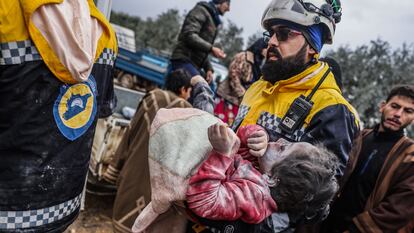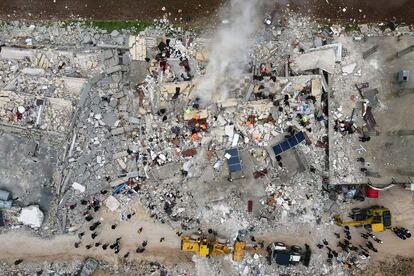For Syria, the earthquake is the latest in a series of tragedies
The tremor has deepened the drama of a country beset by 12 years of civil war that killed half a million people and created 6.6 million refugees. Syrians were also dealing with an economic crisis, Covid and cholera

In northwestern Syria, the area of the country most affected by the earthquake that hit early Monday, nearly 12 years of civil war had produced three terrible scenarios for such an event: buildings that were already damaged by the bombardments, strained medical services and an economy in tatters. The natural disaster has only deepened the drama created by years of fighting that had already caused around half a million deaths and created 6.6 million refugees. While the victim count is still underway, so far the earthquake – which had its epicenter in Turkey – has left a trail of around 1,300 dead: 570 in the areas controlled by the government of Damascus and more than 700 in the territory held by the forces opposed to the Bashar al-Assad regime, according to information provided by the White Helmets (the Syrian Civil Defense volunteer corps).
Since 2019, Syria has been accumulating tragedy upon tragedy. First, its economy was hit by the Lebanese economic and financial crisis, which ranks among the three worst economic crises globally since the mid-19th century according to the World Bank. Then came the Covid pandemic, and finally a cholera epidemic.
“The earthquake will aggravate an already dramatic situation; with a poverty rate of 80%, very high unemployment; inflation that continues to rise, especially in the daily basket of goods since part of the wheat came from Russia and Ukraine; and a currency that has lost almost 80% of its value,” says Ignacio Álvarez-Ossorio, a professor of Arab and Islamic Studies at the Complutense University of Madrid and a specialist in the conflict, about which he recently published Siria: la década negra (2011-2021) (or Syria: the dark decade [2011-2021]).

Although for different reasons, some of the scenes from Monday were already familiar to many Syrians: the desperate search for the missing among the rubble, the corpses in black bags, the damaged water tanks, the scars on the buildings... The Syrian Civil Defense, better known as the White Helmets, has pointed out that heavy rains and snow have blocked some roads and are preventing some of their teams from reaching the places where help is needed.
The earthquake has affected both areas controlled by the government of Al-Assad and rebel areas, from the last jihadist stronghold to the forces supported by Ankara in a deeply globalized conflict. Of the 4.6 million people living in northwestern Syria, 90% are in need of humanitarian aid. There, where 2.9 million are displaced people, 1.8 million of them live in one of the 1,400 existing displacement camps, in informal settlements, or simply inside abandoned buildings that were bombed by forces loyal to Damascus or its ally Russia. It is a kind of rebel stronghold where people have ended up as a result of the thrust of the regular forces since Moscow entered the conflict and changed its course. Hayat Tahrir Al Sham jihadists are in control of Idlib province. Other parts of the north also affected by the earthquake are in the hands of Turkey and the militias it supports, or else the Kurds.
Although both the government zone and the rebel zone have been affected by the earthquake, the day after looks much bleaker for the opposition, whose great supporters are Turkey and Qatar. The neighboring country will predictably be more concerned with healing its own wounds. In addition, NGOs and international organizations will find it difficult to introduce aid through the only possible place: Bab Al Hawa. It is the only border crossing through which the United Nations can do so without the need of seeking prior approval from Damascus. The United Nations estimates that about 2.5 million people depend on the aid that it carries through that single umbilical cord. This spot has also been damaged by the earthquake. Amnesty International has asked Al-Assad to allow humanitarian aid to reach all areas of the country “without restrictions.” The demand has been made via a statement by the group’s deputy director for the Middle East and North Africa, Aya Majzoub.
Last January, the United Nations Security Council approved extending this opening for another six months. Russia reluctantly allowed it. Since 2019, it has criticized the arrangement, considering that the UN should channel aid through the Al-Assad government. There were sighs of relief after the vote, as it was particularly sensitive, coming as it did in the middle of the war in Ukraine. Russia had little incentive this time around to make a gesture to the West and it was feared that it would use its permanent seat on the Council to veto it.
The alliance scheme of the Syrian war also seems to be at work after the earthquake. Russia, the United Arab Emirates and Algeria have already announced that they will send humanitarian aid to the Damascus government. “Although communications are very complicated in the affected area of Turkey, also due to the winter storm, it is much more likely that aid will arrive there than it will to the rebel areas of Idlib, which is suffering from a blockade by the regime, which it is not going to lift even in these circumstances,” says Álvarez-Ossorio.
Living conditions in Idlib have improved since 2020, when Moscow and Ankara entered into a de facto ceasefire, but there is a risk that the earthquake could lead to a new wave of refugees heading to Turkey, where authorities are aiming for the exact opposite: for the 3.7 million Syrians already in its territory to go back home. Syrian refugees in Turkey are under increasing pressure to return to their country, and the fact that Turkey is holding elections in June has not helped soften the rhetoric about them.
Sign up for our weekly newsletter to get more English-language news coverage from EL PAÍS USA Edition
Tu suscripción se está usando en otro dispositivo
¿Quieres añadir otro usuario a tu suscripción?
Si continúas leyendo en este dispositivo, no se podrá leer en el otro.
FlechaTu suscripción se está usando en otro dispositivo y solo puedes acceder a EL PAÍS desde un dispositivo a la vez.
Si quieres compartir tu cuenta, cambia tu suscripción a la modalidad Premium, así podrás añadir otro usuario. Cada uno accederá con su propia cuenta de email, lo que os permitirá personalizar vuestra experiencia en EL PAÍS.
¿Tienes una suscripción de empresa? Accede aquí para contratar más cuentas.
En el caso de no saber quién está usando tu cuenta, te recomendamos cambiar tu contraseña aquí.
Si decides continuar compartiendo tu cuenta, este mensaje se mostrará en tu dispositivo y en el de la otra persona que está usando tu cuenta de forma indefinida, afectando a tu experiencia de lectura. Puedes consultar aquí los términos y condiciones de la suscripción digital.









































